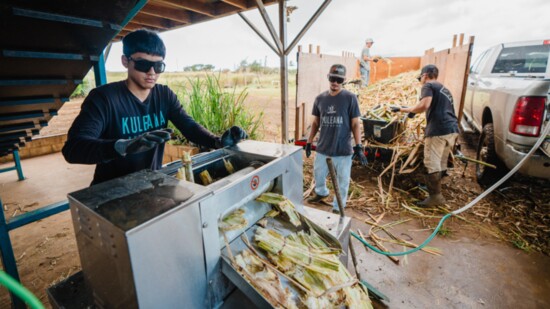In 2007, Steve and Jackie Jefferson sailed around the Caribbean with their two little keiki. On the French island of Martinique, they tasted Rhum Agricole. This variety uses fresh-pressed sugarcane juice instead of molasses but only accounts for 3% of the global rum production.
“We had this huge moment. We had never tried anything like this before,” Steve recalls. The experience was so impactful that the Jeffersons dreamed about making their Rhum Agricole with fresh sugarcane juice grown where they were born and raised, Hawai’i.
Like most people, Steve believed sugarcane had been introduced to Hawai’i by the sugarcane planters in the 1800s. That changed after meeting Noa Lincoln, a Stanford University student working on his PhD thesis. Noa demonstrated through DNA testing that about 35 species of kō — a rare, native Hawaiian heirloom sugarcane — derived from the 2 or 3 original cane plants brought by the first settlers to the Hawaiian islands almost a thousand years ago.
“The Hawaiian civilization created an agricultural system that rivaled any major civilization, and sugar cane was a vital element. Knowing that we are part of a culture that helped develop these plants into what we have today is something to be proud of,” shares Steve.
Steve investigated these derived cane plants and learned they had a wide color and flavor range. This cultural treasure had been hiding in plain sight in backyards, gardens, and fields across Hawai’i. He decided to replant these varieties and share their richness with as many people as possible to keep the heritage alive.
As a result, Kuleana Rum Works was established in the mid-2010s on a 45-acre farm near Upolu Point, a strategic place in North Kohala. The salty ocean air, plenty of rain, and fresh breeze make the 35 heirloom Hawaiian kō varieties thrive. Depending on the plant type and weather conditions, the sugarcane cuttings take between 12 and 36 months to be ready for harvest and produce an average of 25 stocks about six feet tall.
After harvesting and pressing the canes, the fresh juice undergoes the fermentation process, where it’s mixed with yeast and water. Kuleana Rum Works differentiates itself from other spirit companies by not boiling the juice, which usually strips it of its taste — instead, the juice ferments naturally in a controlled environment, preserving all its qualities and flavor profiles.
While rum can be distilled at up to 94% alcohol by volume (ABV), this company distills its spirits at a low ABV. The process takes longer, but it ensures the final product is a world-class spirit. “We let many of those flavors come true because we've put a lot of time into developing them,” Steve shares.
Although rum companies can add sugars and coloring up to 2% of the volume without disclosure, Kuleana Rum Works is not into that. “We're completely additive-free,” says Steve. “Most rums have caramel or vanilla syrups added. When they say ‘gold rum,’ it’s actually one of those 94% ABV-near-vodka rums with gold coloring, and people are supposed to think it’s aged.” Instead, the spirits’ color comes naturally from aging in wooden barrels stored at the distillery.
Steve shares an epiphany about Hawaiian culture: “A lot of our decisions are long-term and multi-generational. It boils down to hard choice, easy life versus easy choice, hard life.” This mindset made the company highly respected in the local community and internationally.
During the global pandemic, the Big Island had a shortage of hand sanitizer. Due to federal guidelines, significant volumes of alcohol could not be transported from the mainland. Suddenly, Steve realized he could use the distillery’s alcohol to produce a CDC-approved sanitizer and donate it to the county. It was a hard choice to give it away for free, but hospitals and first responders benefited, and the county later awarded Kuleana Rum Works a grant to buy equipment.
“We were hesitant about using Kuleana (responsibility) as a name, but we look at everything we do through these glasses now. We force ourselves to consider if it’s good for the community. Is this land healthier and better because we’re here or not? Is this the best possible way we could make rum? Or are we taking shortcuts?” says Steve.
The company’s high standards have gained recognition nationwide. What was once just a dream has gone from a distillery to a sugar cane farm and then a bar and restaurant, but Steve doesn’t claim all the credit.
“I'm extremely proud of everybody who’s part of this. The company now belongs to 50 families, and we have hundreds of investors all over the world. By showcasing Hawai’i, we can be as good or better than the world's best.”
Learn more at KuleanaRum.com.
We had this huge moment. We had never tried anything like this before.
We were hesitant about using Kuleana (responsibility) as a name, but we look at everything we do through these glasses now.
